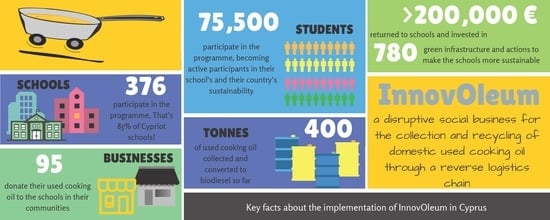Circular Bioeconomy in Action: Collection and Recycling of Domestic Used Cooking Oil through a Social, Reverse Logistics System
Abstract
1. Introduction
2. Method
2.1. Setting Up InnovOleum in Cyprus
- Oil collection drum installation: Interested schools contact the program and an oil collection drum is installed at the school, in a suitable, accessible, and secure location. Each school then defines a day of the week when students take UCO placed in bottles from home and deposit it in the drum. Once the drum is almost full, the school contacts the program, a driver is dispatched to the school, and the oil is collected, using a van equipped with pumps and tanks that are used to load the bulk oil and transport it to a management facility.
- Community involvement: Schools are encouraged to involve their local community in the program in several ways, including (a) the provision of information to the general public about the program and encouraging the entire community to donate their dUCO; (b) involving local businesses (HORECA) to donate at least part of their UCO to their neighborhood’s school, especially if a family member is attending that school; and (c) collaborating with the local authority to facilitate dUCO collection from less accessible households.
- Educational presentations: Participating schools are visited by the InnovOleum mobile information and education center that is operated by a team of young, unemployed graduates (educators, scientists, engineers, etc.). The mobile education center visits participating schools and, through several experimental setups, delivers age-appropriate, interactive presentations on (i) the entire process of the transformation of UCO into biodiesel, (ii) water- and energy-saving measures, and (iii) organic waste management, especially composting. Students participate in the implementation of the experiments, and this provides them with hands-on, experiential education on sustainability and its link to sciences and technology.
- Digital platform: Schools have access to a digital platform through which they can identify and purchase sustainable ‘green’ technologies that they can implement at the school using the funds received from InnovOleum.
- Experiential education: An educational guide is available, allowing teachers to use the program as an educational tool in their classroom, e.g., in mathematics, sciences, or languages. The guide is continuously updated to include any new technologies/infrastructure installed at the schools and provides details on how to incorporate them to become an essential part of teaching, allowing students to observe phenomena and understand the governing principles. In this manner, the entire school infrastructure can become part of the educational environment, facilitating experiential education for the students and promoting education in sciences, technology, engineering, and mathematics (STEM).
2.2. Selection of Schools
2.3. Stakeholder Participation
2.4. Data Collection, Analysis, and Interpretation
3. Results
4. Discussion
- It helps to transform school infrastructure through the provision of funds for making schools ‘greener’ and helps further traditional and experiential education at schools. This helps to meet the United Nations Sustainable Development Goal number 4 ‘Quality Education’, as it promotes inclusive and quality education as well as lifelong learning, through the involvement of the community [22].
- School children and youth actively participate in the process, and this creates a sense of ownership and the feeling of co-responsibility for the ‘greening’ activities that are implemented.
- The implementation of practical solutions to real environmental and social problems allows children, youth, and the society to become a part of the circular economy and contribute to the fight against climate change, thus helping to meet Sustainable Development Goal 13, to take urgent action to combat climate change and its impact.
- Through the integration of the InnovOleum educational material, developed to take into consideration green technologies and infrastructure, into the academic curriculum, sciences, technology, engineering, and mathematics (STEM) are promoted among students. This is particularly important in countries such as Cyprus, where interest of youth in STEM is the lowest in Europe [25].
- The presence of young, female scientists as InnovOleum’s environmental educators/trainers further adds to the promotion of STEM among young women.
- By employing unemployed young scientists as environmental educators/trainers, InnovOleum addresses an important European and global issue: Youth unemployment [22,26,27]. The young scientists are provided with skills development and capacity building on issues related to green economy and social entrepreneurship, thus increasing their employability.
- Local community actively participating in the UCO collection enhances the public commitment and support towards schools.
5. Conclusions
Author Contributions
Funding
Acknowledgments
Conflicts of Interest
References
- Gui, M.M.; Lee, K.T.; Bhatia, S. Feasibility of edible oil vs. non-edible oil vs. waste edible oil as biodiesel feedstock. Energy 2008, 33, 1646–1653. [Google Scholar] [CrossRef]
- Greenea. Available online: https://www.theicct.org/sites/default/files/publications/Greenea%20Report%20Household%20UCO%20Collection%20in%20the%20EU_ICCT_20160629.pdf (accessed on 15 November 2018).
- European Union. Regulation (EC) No 1069/2009 of the European Parliament and of the Council of 21 October 2009 laying down health rules as regards animal by-products and derived products not intended for human consumption and repealing Regulation (EC) No 1774/2002 (Animal by-products Regulation). Off. J. Eur. Union 2009, 300, 1–33. [Google Scholar]
- European Union. Directive 2009/28/EC of the European Parliament and of the Council of 23 April 2009 on the promotion of the use of energy from renewable sources and amending and subsequently repealing Directives 2001/77/EC and 2003/30/EC (Text with EEA relevance). Off. J. Eur. Union 2009, 140, 16–62. [Google Scholar]
- European Union. Directive 2009/30/EC of the European Parliament and of the Council of 23 April 2009 amending Directive 98/70/EC as regards the specification of petrol, diesel and gas-oil and introducing a mechanism to monitor and reduce greenhouse gas emissions and amending Council Directive 1999/32/EC as regards the specification of fuel used by inland waterway vessels and repealing Directive 93/12/EEC (Text with EEA relevance). Off. J. Eur. Union 2009, 140, 88–113. [Google Scholar]
- European Union. Directive (EU) 2015/1513 of the European Parliament and of the Council of 9 September 2015 amending Directive 98/70/EC relating to the quality of petrol and diesel fuels and amending Directive 2009/28/EC on the promotion of the use of energy from renewable sources (Text with EEA relevance). Off. J. Eur. Union 2015, 239, 1–29. [Google Scholar]
- CBI. Available online: https://www.cbi.eu/sites/default/files/market_information/researches/trade-statistics-europe-vegetable-oils-2015.pdf (accessed on 10 January 2018).
- European Biodiesel Board. Available online: http://www.ebb-eu.org/stats.php (accessed on 9 January 2019).
- Greenea. Available online: http://www.greenea.com/wp-content/uploads/2018/04/Greenea-Platts-Geneva-2018.pdf (accessed on 9 January 2019).
- Hanisah, K.; Kumar, S.; Tajul, A.Y. The management of waste cooking oil: A preliminary study. Health Environ. J. 2013, 4, 76–81. [Google Scholar]
- Thames Water. Available online: https://corporate.thameswater.co.uk/Media/News-releases/Monster-fatberg-longer-than-two-Wembley-football-pitches-clogging-up-Whitechapel-sewer (accessed on 9 January 2019).
- Genovese, A.; Acquaye, A.A.; Figueroa, A.; Koh, L.S.C. Sustainable supply chain management and the transition towards a circular economy: Evidence and some applications. Omega 2017, 66, 344–357. [Google Scholar] [CrossRef]
- Moecke, E.H.S.; Feller, R.; dos Santos, H.E.; de Medeiros Machado, M.; Vieiera Cubas, A.L.; de Aguiar Dutra, A.R.; Vieira Santos, L.L.; Soares, S.R. Biodiesel production from waste cooking oil for use as fuel in artisanal fishing boats: Integrating environmental, economic and social aspects. J. Clean. Prod. 2016, 135, 679–688. [Google Scholar] [CrossRef]
- Pleanjai, S.; Gheewala, S.H.; Garivait, S. Greenhouse gas emissions from production and use of used cooking oil methyl ester as transport fuel in Thailand. J. Clean. Prod. 2009, 17, 873–876. [Google Scholar] [CrossRef]
- Li, H.L.; Yu, P.H. Conversion of waste cooking oil into environmentally friendly biodiesel. SpringerPlus 2015, 4 (Suppl. 2), P7. [Google Scholar] [CrossRef]
- Directorate-General for Research and Innovation. Innovating for Sustainable Growth: A Bioeconomy for Europe. Available online: https://publications.europa.eu/en/publication-detail/-/publication/1f0d8515-8dc0-4435-ba53-9570e47dbd51 (accessed on 21 March 2019).
- Philp, J. The bioeconomy, the challenge of the century for policy makers. New Biotechnol. 2018, 40, 11–19. [Google Scholar] [CrossRef] [PubMed]
- Rogers, D.S.; Tibben-Lembke, R.S. Going Backwards: Reverse Logistics Trends and Practices; Center for Logistics Management, University of Nevada, Reno, Reverse Logistics Executive Council: Pittsburgh, PA, USA, 1999. [Google Scholar]
- Nikolaou, I.E.; Evangelinos, K.I.; Allan, S. A reverse logistics social responsibility evaluation framework based on the triple bottom line approach. J. Clean. Prod. 2013, 56, 173–184. [Google Scholar] [CrossRef]
- Sarkis, J.; Helms, M.M.; Hervani, A.A. Reverse Logistics and Social Sustainability. Corp. Soc. Responsib. Environ. Manag. 2010, 17, 337–354. [Google Scholar] [CrossRef]
- Ramos, T.R.P.; Gomes, M.I.; Barbosa-Póvoa, A.P. Planning a sustainable reverse logistics system: Balancing costs with environmental and social concerns. Omega 2014, 48, 60–74. [Google Scholar] [CrossRef]
- United Nations. Transforming Our World: The 2030 Agenda for Sustainable Development A/RES/70/1; United Nations: Nairobi, Kenya, 2015. [Google Scholar]
- Vinyes, E.; Oliver-Solà, J.; Ugaya, C.; Rieradevall, J.; Gasol, C.M. Application of LCSA to used cooking oil waste management. Int. J. Life Cycle Assess. 2013, 18, 445–455. [Google Scholar] [CrossRef]
- Dos Santos Ferreira, L.; da Silva César, A.; Conejero, M.A.; da Silva Guabiroba, R.C. A voluntary delivery point in reverse supply chain for waste cooking oil: An action plan for participation of a public-school in the State of Rio de Janeiro, Brazil. Recycling 2018, 3, 48. [Google Scholar] [CrossRef]
- European Commission. Education and Training Monitor 2018 Country Analysis; Publications Office of the European Union: Luxembourg, 2018. [Google Scholar]
- European Commission. Available online: https://ec.europa.eu/eurostat/statistics-explained/index.php?title=Unemployment_statistics_and_beyond#Youth_unemployment (accessed on 5 January 2019).
- OECD. OECD Employment Outlook 2018; OECD Publishing: Paris, France, 2018. [Google Scholar]
- OECD/FAO. Biofuels. In OECD-FAO Agricultural Outlook 2016–2025; OECD Publishing: Paris, France, 2015. [Google Scholar]
- Tsoutsos, T.D.; Tournaki, S.; Paraíba, O.; Kaminaris, S.D. The Used Cooking Oil-to-biodiesel chain in Europe assessment of best practices and environmental performance. Renew. Sustain. Energy Rev. 2016, 54, 74–83. [Google Scholar] [CrossRef]
- European Biodiesel Board. Available online: www.ebb-eu.org (accessed on 5 December 2018).
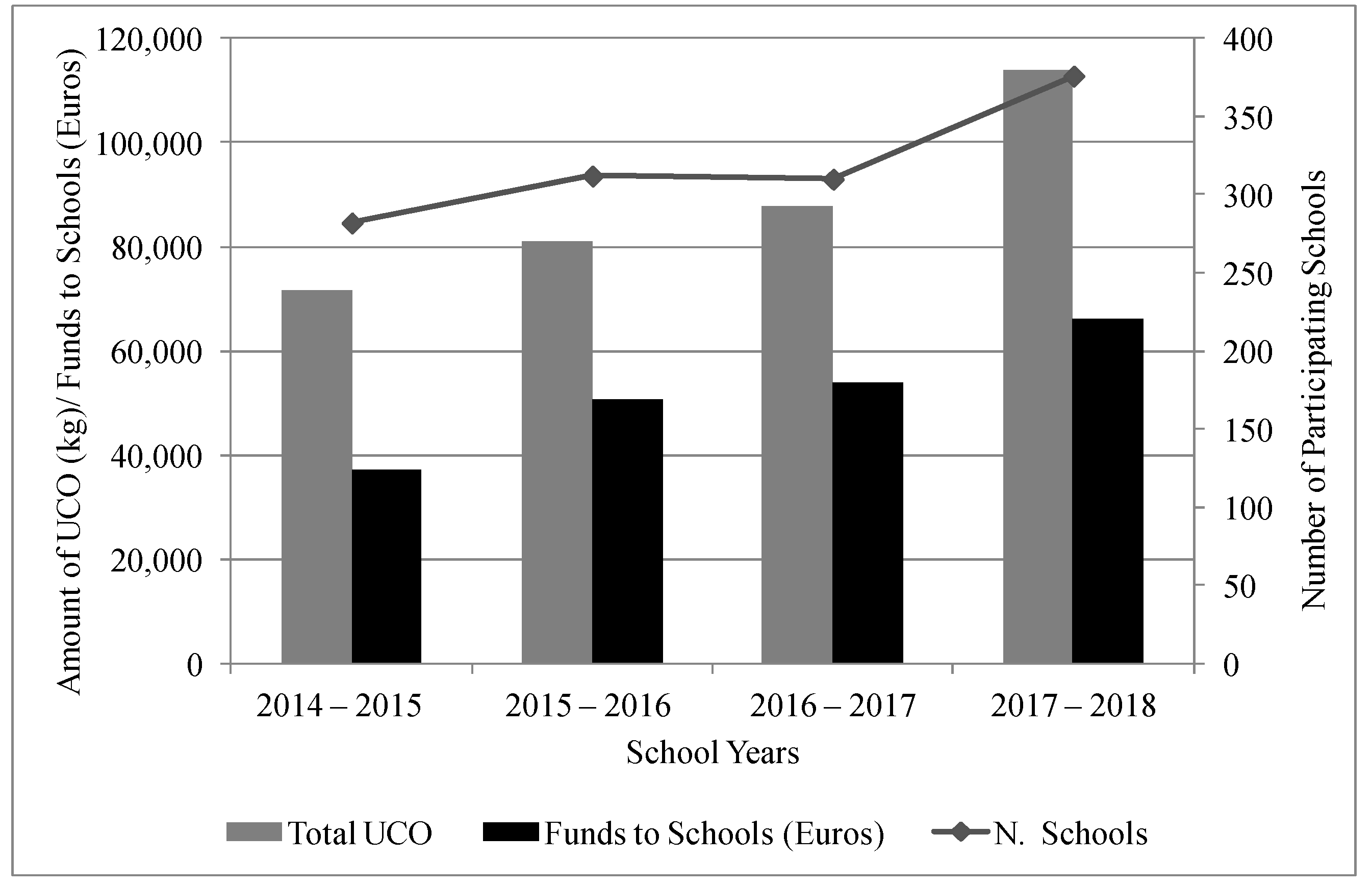
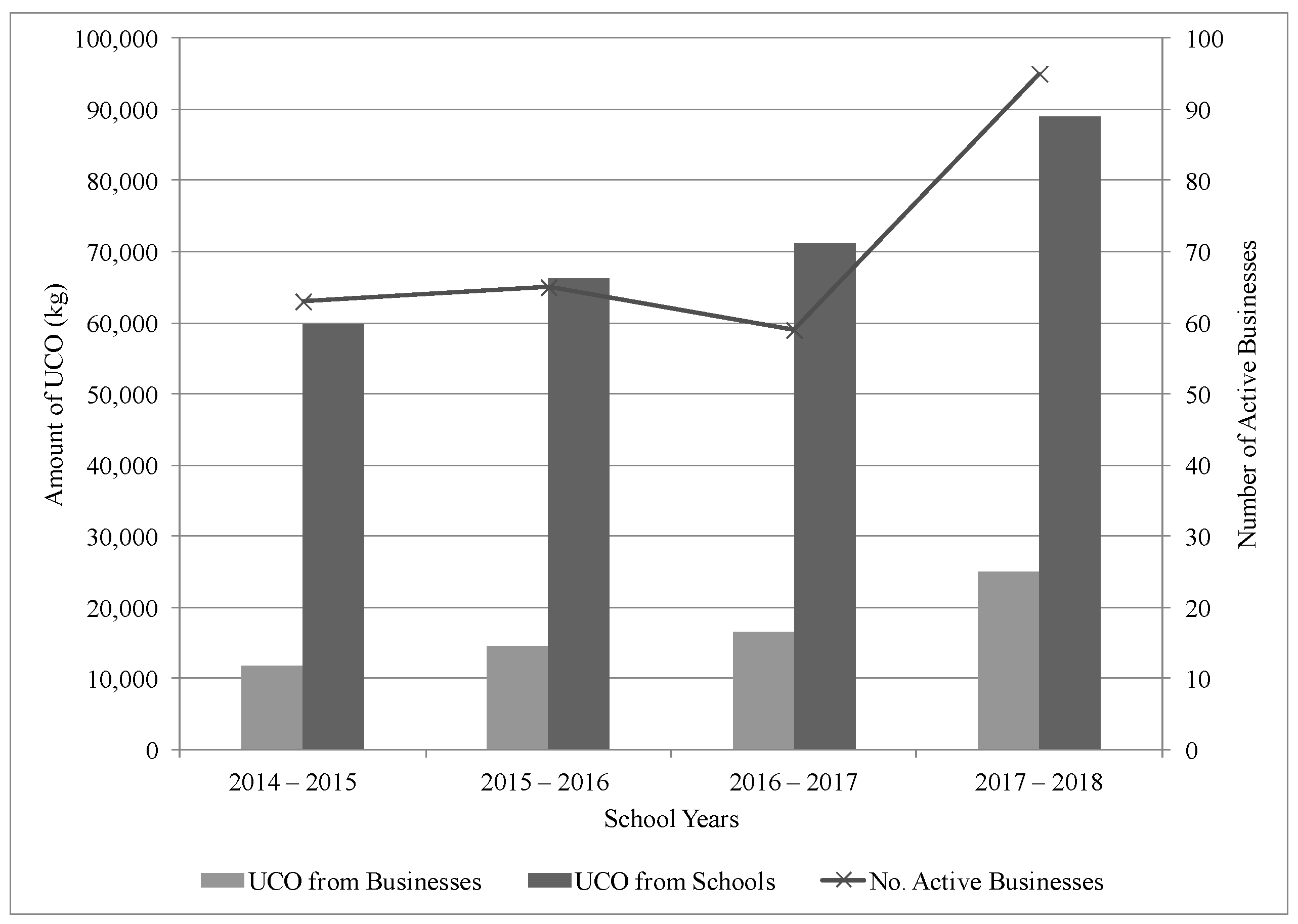
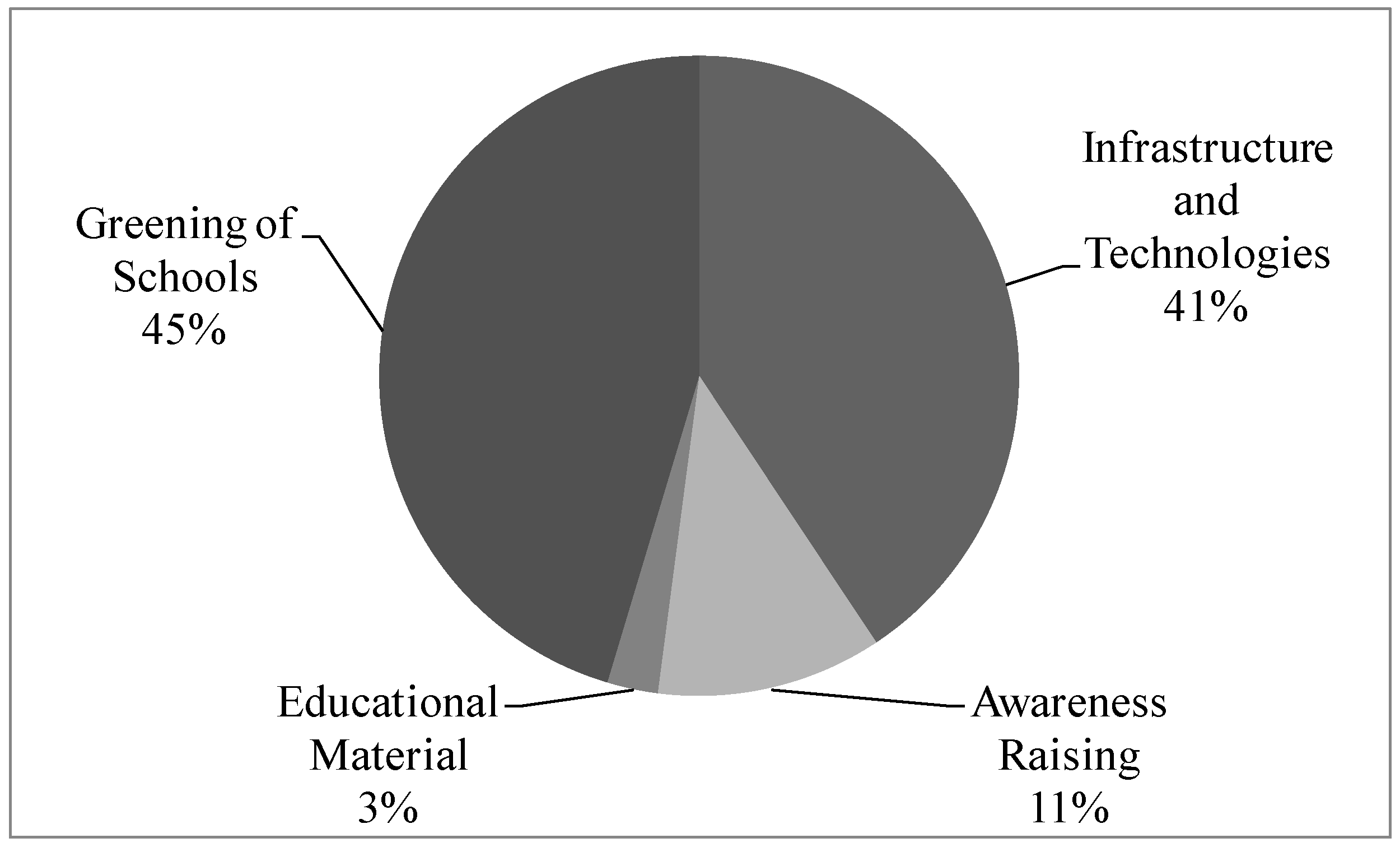
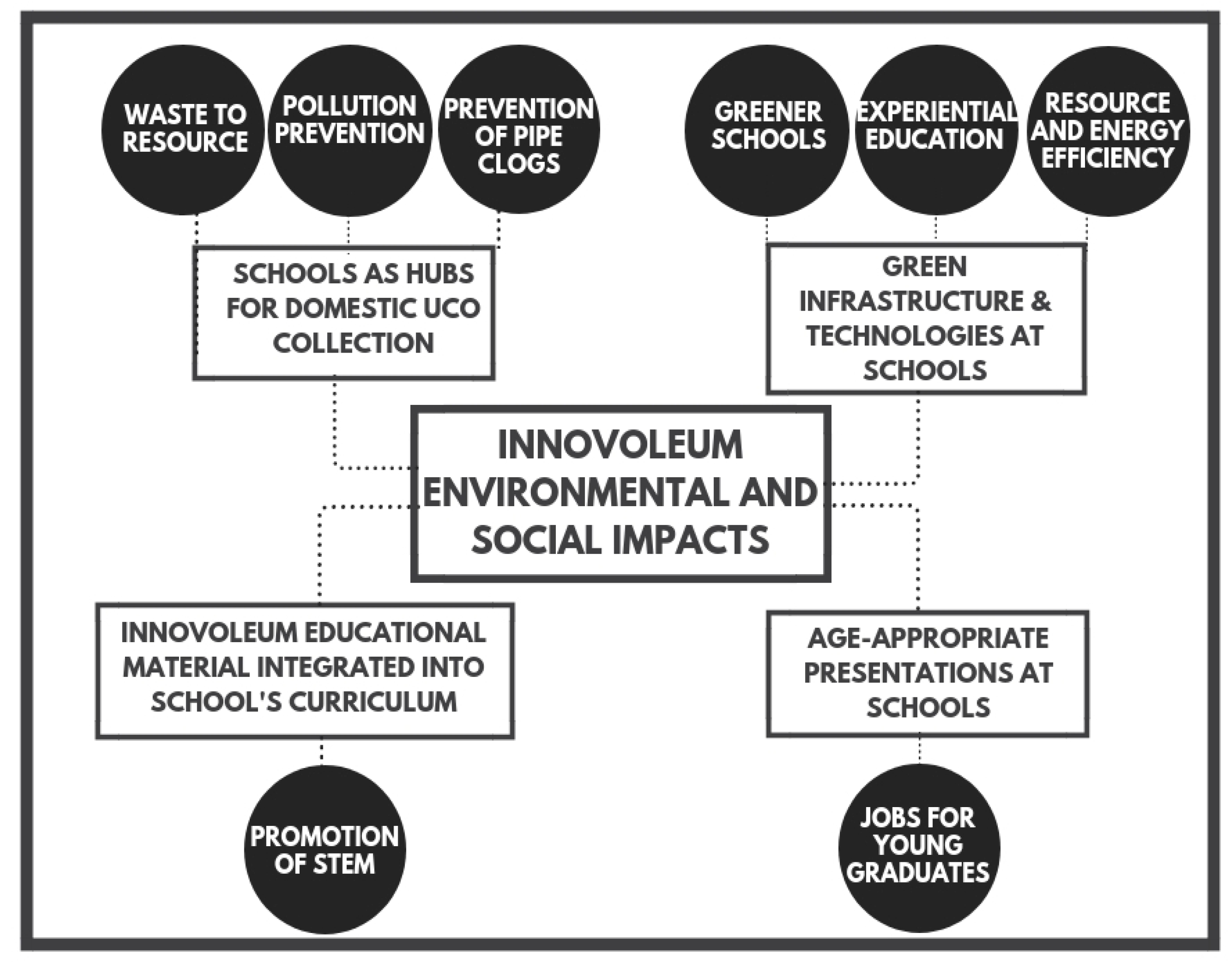
| School Year | No. Participating Schools | UCO from Schools (kg) | No. Active Businesses | UCO from Businesses (kg) | Total UCO Collected (kg) | Funds to Schools (€) |
|---|---|---|---|---|---|---|
| 2014–2015 | 282 | 59,885 | 63 | 11,726 | 71,611 | 37,161 |
| 2015–2016 | 312 | 66,296 | 65 | 14,565 | 80,861 | 50,836 |
| 2016–2017 | 310 | 71,105 | 59 | 16,507 | 87,612 | 53,761 |
| 2017–2018 | 376 | 88,933 | 95 | 24,933 | 113,866 | 66,249 |
© 2019 by the authors. Licensee MDPI, Basel, Switzerland. This article is an open access article distributed under the terms and conditions of the Creative Commons Attribution (CC BY) license (http://creativecommons.org/licenses/by/4.0/).
Share and Cite
Loizides, M.I.; Loizidou, X.I.; Orthodoxou, D.L.; Petsa, D. Circular Bioeconomy in Action: Collection and Recycling of Domestic Used Cooking Oil through a Social, Reverse Logistics System. Recycling 2019, 4, 16. https://doi.org/10.3390/recycling4020016
Loizides MI, Loizidou XI, Orthodoxou DL, Petsa D. Circular Bioeconomy in Action: Collection and Recycling of Domestic Used Cooking Oil through a Social, Reverse Logistics System. Recycling. 2019; 4(2):16. https://doi.org/10.3390/recycling4020016
Chicago/Turabian StyleLoizides, Michael I., Xenia I. Loizidou, Demetra L. Orthodoxou, and Demetra Petsa. 2019. "Circular Bioeconomy in Action: Collection and Recycling of Domestic Used Cooking Oil through a Social, Reverse Logistics System" Recycling 4, no. 2: 16. https://doi.org/10.3390/recycling4020016
APA StyleLoizides, M. I., Loizidou, X. I., Orthodoxou, D. L., & Petsa, D. (2019). Circular Bioeconomy in Action: Collection and Recycling of Domestic Used Cooking Oil through a Social, Reverse Logistics System. Recycling, 4(2), 16. https://doi.org/10.3390/recycling4020016




